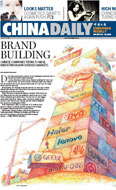Next step for firms: Build better brands
Updated: 2011-03-11 10:25
By Cindy Tian (China Daily European Weekly)
When Zhang Ruimin took the reins of an ailing State-owned refrigerator factory in 1984, few anticipated that by 2010 Haier would become the largest white goods manufacturer in the world and ranked third among household appliance companies on Forbes's Top 600 list of the "World's Most Reputable Companies".
Based on revenue and performance, companies headquartered in China are increasingly among the world's most successful companies. In 2010, 46 companies with headquarters in China made Fortune's Global 500 list.
Yet, no company with headquarters in China was among the "Best Global Brands", an annual brand-value ranking by Interbrand that listed Coca-Cola, IBM, Microsoft, Google and GE as the top five brands in 2010. Although companies from China have had tremendous performances, many are still defining their promise.
Companies from China have a great spirit of learning. Companies that have previously focused on China's domestic market are now making dedicated efforts to build a global brand. It is only a matter of time before brands from China make a splash globally.
A brand is essentially a promise to stakeholders. Companies headquartered in China need to decide what their promise is and set about communicating that promise in a meaningful way to consumers, employees, regulators, shareholders, partners and suppliers. But there are two major challenges facing companies from China: to develop products and a brand simultaneously, and to address the global talent shortage. By first understanding these challenges, Chinese companies can learn to address and confront them to advance the brand building process over time.
As a company develops its products, sales channels and services, it must not isolate the brand building process. The company's promise, then, must be developed alongside the products because they reinforce each other.
Successful brands evolve with their products, and often feel like natural extensions developed for specific market groups. Coca-Cola has successfully built its brand primarily because every product it develops and every citizenship program it delivers is aligned with the brand's promise.
Finding a promise can be difficult for many large conglomerates from China, due to the wide range of products and services they provide. But even large conglomerates can build strong, effective brands by aligning their products with their promise.
In terms of talent, companies in China have increased their scope and revenue so quickly that the market has not had sufficient time to prepare enough senior talent with both domestic and international experience to take up leadership roles in every aspect of businesses. Attracting top senior talent, integrating them into the company's corporate culture, and retaining them are imperative for building global brands.
The good news is that a new global talent pool is emerging. Many Chinese nationals who are educated overseas are returning to China, many Chinese nationals are acquiring solid experiences and knowledge while working for top multinational companies in China or abroad, and there is a tremendous volume of international professionals who have worked in China.
Last, it is important to foster strong partnerships with talent outside the company. Public relations firms, ad agencies or marketing strategy consultants can be great sources of ideas and advice on the brand's strategy. We have identified six elements that companies from China should consider when building global brands:
1. Define the brand clearly.
No brand can be everything for everyone. Define customers and position products and services in a clear and compelling way. Each new product or service the company creates should be aligned with the brand's overall promise.
2. Understand that building a global brand is a long and continuous process.
Coca-Cola has worked on its brand for 125 years and it took 42 years to bring the brand to the world stage. The promise at the core of the company and brand has remained consistent.
3. Make a commitment.
The entire organization, from the top down, needs to make a commitment to build and support the brand. This includes empowering communication and marketing executives to play an important role in generating ideas and developing products.
4. Understand local stakeholders and their expectations.
Only companies which can be effective locally can become truly global.
5. Be aware of a new world of consumers, demands or issues with every action.
Dive deep to understand each market segment and consumer group, and map potential problem areas so the company can speak directly and address any misperceptions.
6. Engage consumers.
Burson-Marsteller research shows that 80 percent of the Fortune Global 100 companies were being talked about on Twitter. Join local conversations and incorporate digital programs into everything the company does.
The author is executive chairwoman of Burson-Marsteller China.
E-paper

Sindberg leaves lasting legacy
China commemorates Danish hero's courage during Nanjing Massacres.
Preview of the coming issue
Crystal Clear
No more tears
Specials

NPC & CPPCC sessions
Lawmakers and political advisers gather in Beijing to discuss major issues.

Sentimental journey
Prince William and Kate Middleton returned to the place where they met and fell in love.

Rent your own island
Zhejiang Province charts plans to lease coastal islands for private investments
